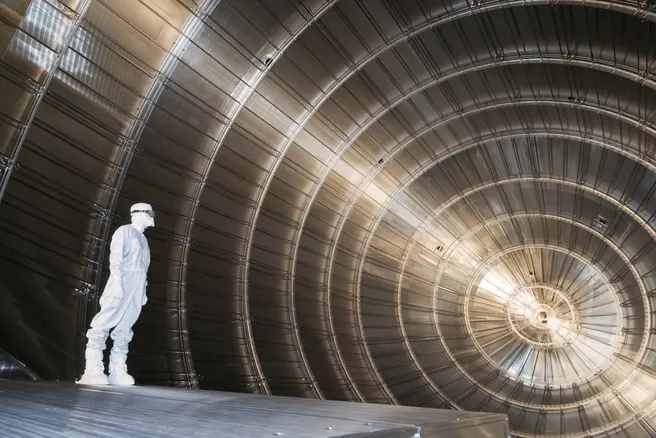The international KArlsruhe TRItium Neutrino Experiment (KATRIN) at the Karlsruhe Institute of Technology (KIT) has again surpassed its achievements. The latest data published in Science establish an upper limit of 8 x 10-37 kg (or, in scientific language, 0.45 eV/c2) for the neutrino mass. With this result, KATRIN, which measures neutrino mass in the laboratory using a model-independent method, has again set a world record. The KATRIN team of the Excellence Cluster ORIGINS and the Collaborative Research Center 1258 at the Technical University of Munich have made important contributions to this success.
Neutrinos are among the most enigmatic particles in the universe. They are omnipresent yet interact extremely rarely with matter. In cosmology, they influence the formation of large-scale galaxy structures, while in particle physics, their minuscule mass indicates previously unknown physical processes. Precisely measuring the neutrino mass is, therefore, essential for a complete understanding of the fundamental laws of nature.
This is precisely where the KATRIN experiment with its international partners comes into play. KATRIN utilizes the beta decay of tritium, an unstable hydrogen isotope, to assess the mass of neutrinos. The energy distribution of the electrons resulting from the decay enables a direct kinematic determination of the neutrino mass. Achieving this requires highly advanced technical components: the 70-meter-long beamline houses an intense tritium source and a high-resolution spectrometer with a diameter of 10 meters. This cutting-edge technology allows for unprecedented precision in direct neutrino mass measurements.
With the current data from the KATRIN experiment, an upper limit of 0.45 electron volt/c2 (corresponding to 8 x 10-37 kilograms) could be derived for the neutrino mass. Compared to the last results from 2022, the upper limit could thus be reduced by almost a factor of two.
Analysis of the data
The quality of the first datasets has steadily improved since the start of measurements in 2019. "For this result, we have analyzed five measurement campaigns, totaling approximately 250 days of data collection from 2019 to 2021 – about a quarter of the total data expected from KATRIN," explains Kathrin Valerius (KIT), one of the two co-spokespersons of the experiment. Susanne Mertens (Max Planck Institute for Nuclear Physics (MPIK) and Technical University of Munich (TUM)) adds: “With each campaign, we have gained new insights and further optimized the experimental conditions.”
The evaluation of the extremely complex data posed an enormous challenge and required the highest level of precision from the international data analysis team. “The analysis of the KATRIN data is highly demanding, as an unprecedented level of accuracy is required,” emphasizes Alexey Lokhov (KIT), Co-Analysis Coordinator. Christoph Wiesinger (TUM/MPIK), Co-Analysis Coordinator, adds: “We need to employ state-of-the-art analysis methods, with artificial intelligence playing a crucial role.”
To tackle this challenge, the KATRIN group of the Excellence Cluster ORIGINS and the Collaborative Research Center 1258 ‘Neutrinos and Dark Matter in Astro- and Particle Physics’ (CRC1258) at TUM joined forces with the ORIGINS data science lab (ODSL) scientists. Together, they developed a new software called NETRIUM, which uses neural networks to enable fast and ultra-precise prediction of the tritium spectrum.
Perspective
The researchers look optimistically to the future: “Our measurements of the neutrino mass will continue until the end of 2025. Through the continuous improvement of the experiment and analysis, as well as a larger data set, we expect an even higher sensitivity.” – and possibly groundbreaking new discoveries," says the KATRIN team. KATRIN already leads the global field of direct neutrino mass measurements and has surpassed the results of previous experiments by a factor of four with its initial data. The latest findings indicate that neutrinos are at least a million times lighter than electrons, the lightest electrically charged elementary particles. Explaining this enormous mass difference remains a fundamental challenge for theoretical particle physics.
In addition to the precise measurement of the neutrino mass, KATRIN is already planning the next phase. Starting in 2026, a new detector system, TRISTAN, will be installed. This upgrade to the experiment will enable the search for sterile, a hypothetical particle, which interacts even more feebly than the known neutrinos. With a mass in the keV/c² range, sterile neutrinos are a potential candidate for dark matter. Additionally, KATRIN++ will launch a research and development program to design concepts for a next-generation experiment capable of achieving even more precise direct neutrino mass measurements.
The KATRIN Collaboration
Scientists from over 20 institutions across seven countries are working on the KATRIN project.
Scientific Contact
Prof. Dr. Susanne Mertens
Max-Planck-Institut für Kernphysik
E-Mail: susanne.mertens(at)mpi-hd.mpg.de
Further references:
KATRIN Website: http://www.katrin.kit.edu
Publication: https://www.science.org/doi/10.1126/science.adq9592
Original Article: https://www.kit.edu/kit/pi_2025_029_astroteilchenphysik-neutrinos-sind-leichter-als-0-45-elektronenvolt.php (in German)

